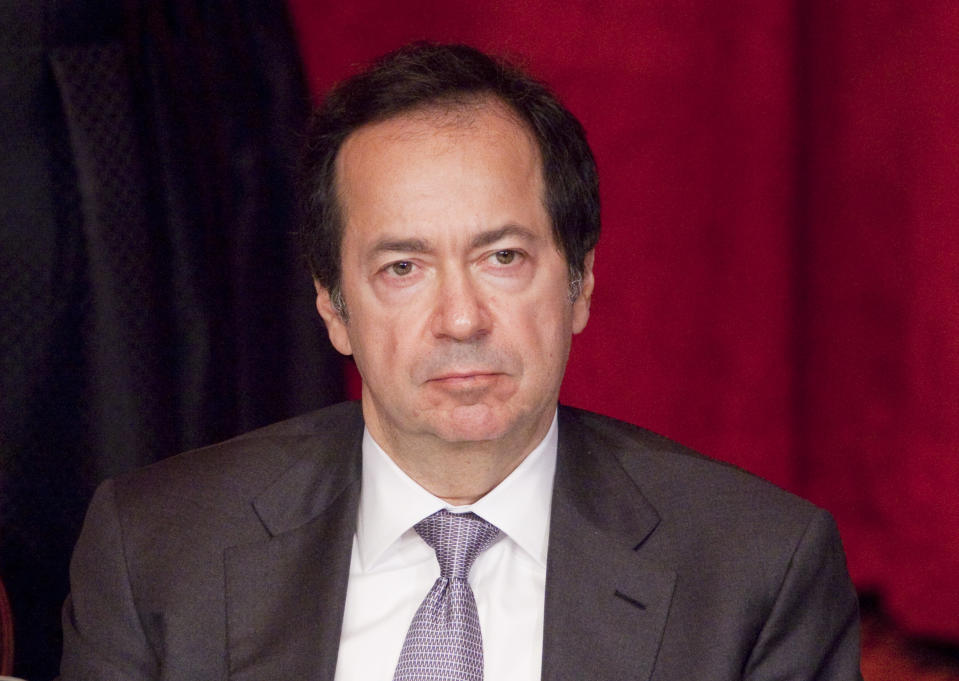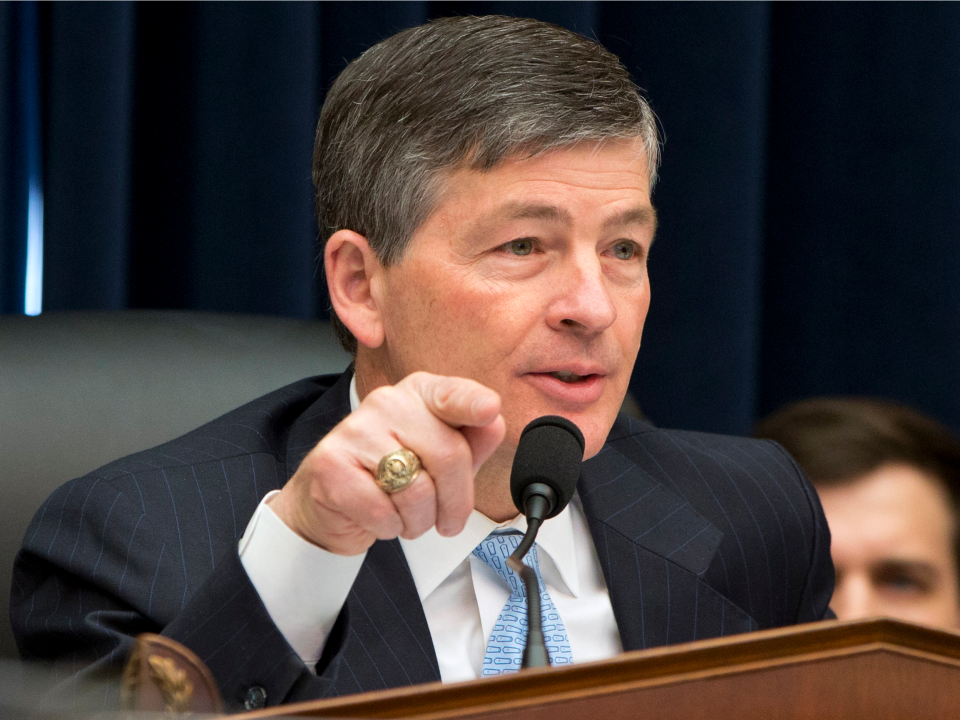Fannie and Freddie's fate depends on whether Trump goes with John or Jeb

Who will Trump choose: John or Jeb?
No, not for a Cabinet slot, but rather in the matter of Fannie Mae and Freddie Mac, the government-sponsored enterprises (GSEs). It’s one of the more contradictory policy decisions confronting the incoming administration. Trump supporter and hedge fund manager John Paulson would like to see Fannie and Freddie reconstituted. But Jeb Hensarling, the Republican chairman of the House Financial Services Committee, has a plan that would kill them.
To back up a bit, the two companies, which guarantee the interest and principal on roughly two-thirds of American mortgages, have long been the backbone of homeownership. During the 2008 financial crisis, with home prices tumbling, mortgage holders defaulting, and the stock prices of the GSEs tumbling, they were taken over by the government and put into a state called conservatorship, where they have languished for the last eight years.
The Obama administration had zero interest in fixing them. In fact, that administration arguably made things worse in 2012, when the GSEs’ overseers changed the rules of the bailout, which initially just granted the government “senior” preferred stock that paid a nice dividend.
Under the changed terms, every dollar the two companies made would be swept into the Treasury’s general account. The result is that Fannie and Freddie — which have over $5 trillion in liabilities combined and remain two of the world’s largest financial institutions — will have no capital by 2018.
That money, $250 billion and counting, could have been used to recapitalize the housing finance system. Instead, there’s zero accountability for how it’s spent.
As a result of the Obama administration’s decision to change the bailout terms, investors, including hedge funds, in Fannie and Freddie’s common and preferred stock, sued. While those suits are wending their way through the courts, the investors — along with affordable housing advocates — have become vocal supporters for reforming Fannie and Freddie and releasing them from conservatorship, which would of course help the value of their stakes.

Since Election Day, the shares of the GSEs have soared some 100%, in large part because John Paulson, whose Paulson Investment Management is an investor in Freddie Mac, was one of Trump’s top economic advisors. As Rick Newman pointed out in Yahoo Finance, the stock price increase might be because other investors think Paulson will be able to get Trump to go his way.
One problem with this conclusion is that rewarding hedge funds seems, on the surface, to be the opposite of the populism that marked Trump’s campaign.
But that seeming inconsistency pales in comparison to the far bigger issue. Hensarling’s plan — which initially had the not-so-subtle title “GSE Bailout Elimination and Taxpayer Protection Act” but has been renamed the Protecting American Taxpayers and Homeowners, or PATH, Act — would indeed eliminate Fannie and Freddie, along with almost all government support for the housing market. Some limited assistance for the poor would remain. If made into law, it would render the investors’ positions worthless (barring some truly ugly compromise in which the investors got paid regardless of the fate of the GSEs.) It is precisely the opposite of what Paulson wants.
In addition, it’s definitively not what many of Trump’s supporters should want. While no one knows exactly what would happen — after all, we’ve never experienced a modern housing market without government support, since Fannie Mae has been around since the Great Depression — Hensarling’s plan does the opposite of its name. It does not support homeowners. Yes, there is an argument that while yanking government support would crush home prices in the short term, and mortgage rates would rise, eventually, the lack of government support would result in more affordable home prices. Maybe. But Hensarling’s plan for sure would also result in more so-called risk-based pricing, meaning that mortgages would be priced based on income levels and geographic desirability. The rich in the mostly liberal wealthy coastal areas would be fine. The very poor would get assistance. The middle class would get crushed. This is not what Trump campaigned on.

What will happen probably boils down to the age-old question of what’s right versus what the political realities are. Whatever the motivations of the hedge funds, they do happen to be right about the structure of the housing market. If we want widespread availability of 30-year fixed-rate mortgages at rates that are comparable across socioeconomic class and geography, we need an implicit or explicit government backstop. Recapitalizing Fannie and Freddie protects that guarantee, and avoids disrupting and potentially destroying a major part of our economic firmament. Moreover, an eventual public offering could be a windfall for taxpayers because Treasury owns warrants to buy 79.9% of the companies’ stock.
If Trump really is a pragmatic deal-maker, this solution offers the proverbial win-win. You might disagree with this point if you think the risk of another taxpayer bailout of the GSEs down the road must be prevented at all costs. I would argue that whatever our housing finance system is, from the big banks to a purely government entity, we’re going to bail it out if it runs into trouble. The best preventative tools are capital, smart regulation (assuming there is such a thing) and a well-structured profit motive that tries to keep mortgage-making sensible.
Trump’s pick for Treasury Secretary, Steven Mnuchin, might push him in Paulson’s direction. Mnuchin, who is a former Goldman Sachs banker (and not incidentally mortgage finance expert) and who invested with Paulson on the purchase of IndyMac, the large lender that failed in the financial crisis, told Fox News that Fannie and Freddie needed to get out of government ownership, saying that “it makes no sense that these…have been controlled by the government for as long as they have…it’s right up there on the top ten list of things that we’re going to get done.” Brian Brooks, who is now Fannie’s general counsel, was a senior executive at OneWest Bank, which is what IndyMac’s new owners renamed it, and helped negotiate its eventual sale to CIT Group. One person who knows Mnuchin says that he can offer one piece of advice: Buy Fannie and Freddie.
There’s a fair amount that the Trump Administration will be able to do without Congress. But Mnuchin also said Fannie and Freddie will have to be “restructured. If that does require Congress, well, it’s an open question as to whether Fannie and Freddie haters including, but definitely not limited to, Hensarling, can be convinced to do anything that resuscitates the companies. Unfortunately, twists and turns in both the past and the present of the GSEs have always been dictated by political realities more than thoughtful policy. The safe bet is that the complicated mess of it all means that the next four years will be a continuation of the last eight: Limbo for Fannie and Freddie.
Bethany McLean is a contributing editor at Vanity Fair and bestselling author. Her recent book is “Shaky Ground: The Strange Saga of the U.S. Mortgage Giants,” published by Columbia Global Reports.

 Yahoo Finance
Yahoo Finance 
